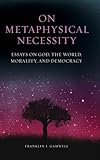On metaphysical necessity : essays on God, the world, morality, and democracy / Franklin I. Gamwell.
Material type: TextPublisher: Albany : State University of New York Press, [2020]Copyright date: c2020Description: viii, 261 pagine ; 23 cmContent type:
TextPublisher: Albany : State University of New York Press, [2020]Copyright date: c2020Description: viii, 261 pagine ; 23 cmContent type: - testo (txt)
- senza mediazione (n)
- volume (nc)
- 9781438479316
- 9781438479309
- 110 23
- BD 111.G33 2020
| Item type | Current library | Call number | URL | Status | Notes | Barcode | |
|---|---|---|---|---|---|---|---|
 eBook
eBook
|
Biblioteca "Angelicum" Pont. Univ. S.Tommaso d'Aquino Nuvola online | online - EBSCO (Browse shelf(Opens below)) | Online access | Not for loan | Accesso per gli utenti autorizzati / Access for authorized users | (ebsco)2499851 | |
 Opera (Magaz.)
Opera (Magaz.)
|
Biblioteca "Angelicum" Pont. Univ. S.Tommaso d'Aquino Magazzino | BD 111.G33 2020 (Browse shelf(Opens below)) | Available | 0030212527 |
Browsing Biblioteca "Angelicum" Pont. Univ. S.Tommaso d'Aquino shelves, Shelving location: Nuvola online Close shelf browser (Hides shelf browser)
Include bibliografia e indice.
Introduction: On transcendental metaphysics -- A defense of metaphysical necessity -- Speaking of God after Aquinas -- Schleiermacher and transcendental philosophy -- The source of temptation -- Moral creatures and their decisions -- On the interpretation of religious freedom : a conversation with Ronald Dworkin -- On religious freedom and its free exercise -- The revolution's promise.
"In this collection of essays, Franklin I. Gamwell offers a defense of transcendental metaphysics, especially in its neoclassical form, and builds a case for its importance as a tool for addressing abiding problems in morality and philosophical theology-including talk about God, human fault, moral decision, and the relationship of politics and religious freedom. In Part I, Gamwell argues against Kant and a wide range of contemporary philosophers, for the validity of transcendental metaphysics designated in the strict sense, i.e., as an explication of the possible as such or existence as such, as the most general features or conditions all possible things have in common. He engages with Aquinas, Schleiermacher, Augustine, and Niebuhr to argue that neoclassical metaphysics, for which the divine whole is itself temporal or forever self-surpassing, provides a more coherent account of God than does classical metaphysics, for which the divine whole is completely eternal. In Part II, Gamwell looks at transcendental metaphysics designated in the broad sense, i.e., as an explication of possible subjectivity as such, as the most general features or conditions all possible subjects have in common. In particular, he takes up the moral opportunity that humans are presented with, and argues that the moral law depends on a comprehensive good, that is, a good defined metaphysically in the strict sense. He then offers an extended discussion of the relation between transcendental metaphysics (in the broad sense) and the meaning of religious freedom and explores Ronald Dworkin's view of the relationship between democracy and religion, the question of whether religious activities are properly exempted from generally applicable laws, and the constitutional debate about national and states' rights".









